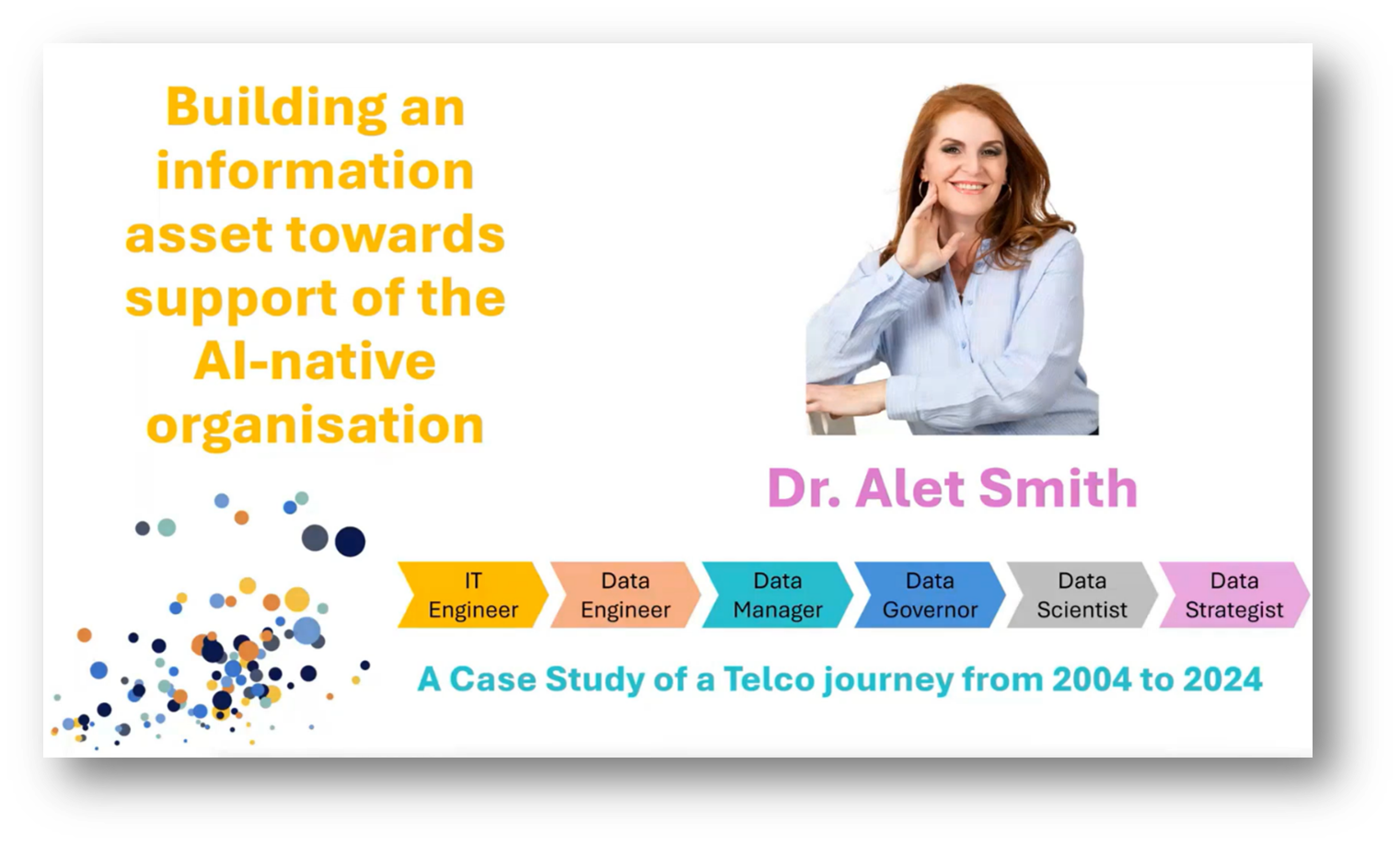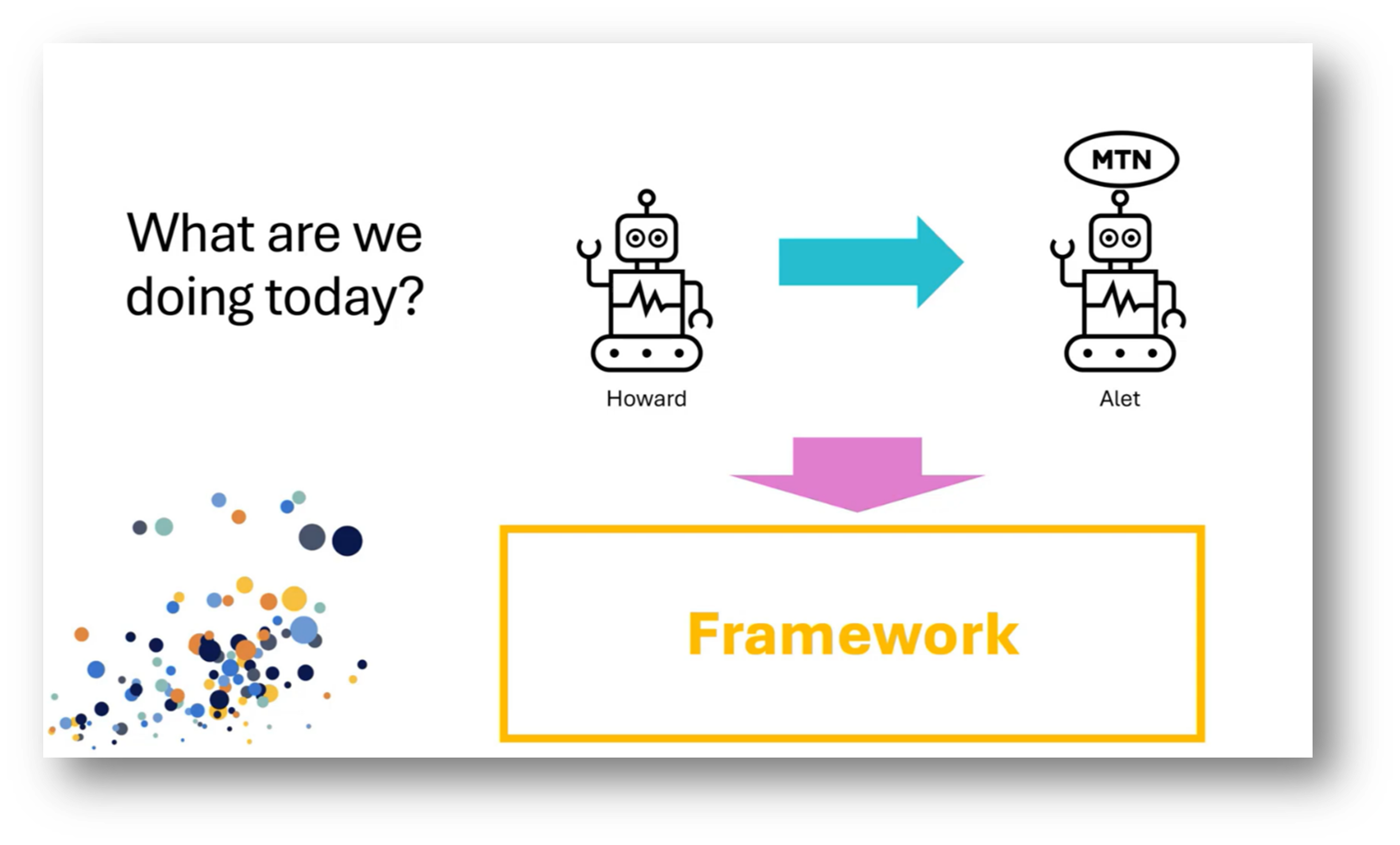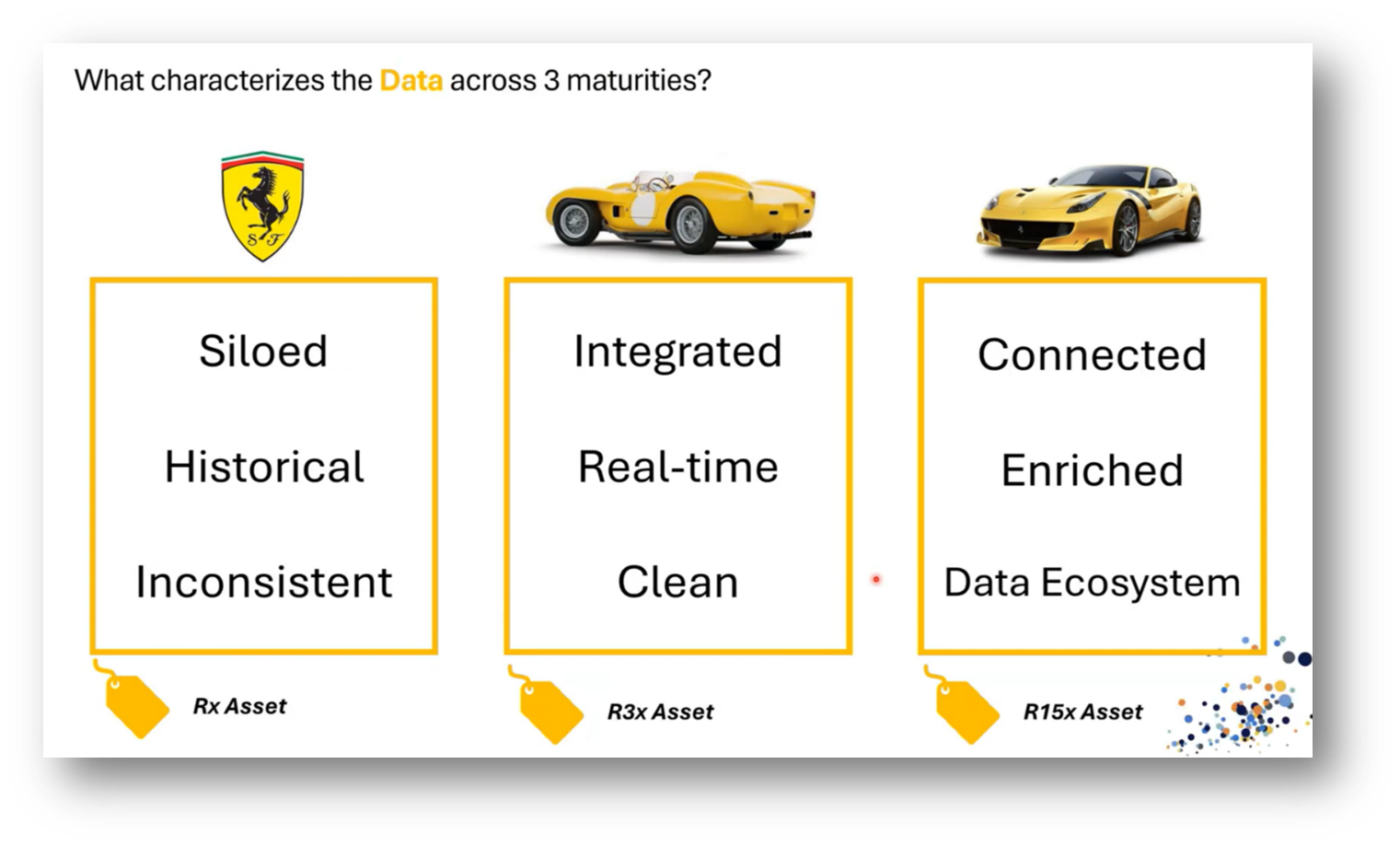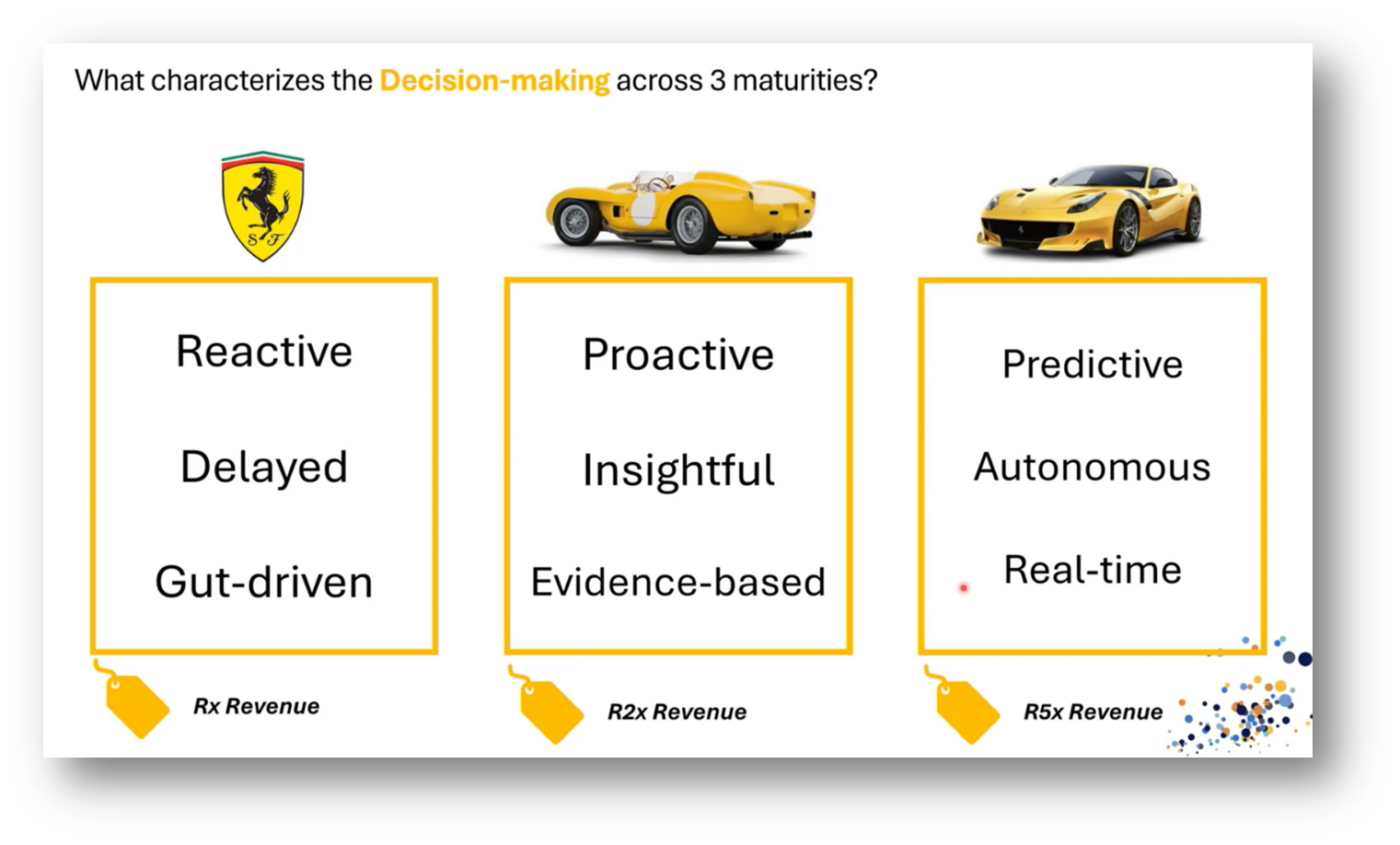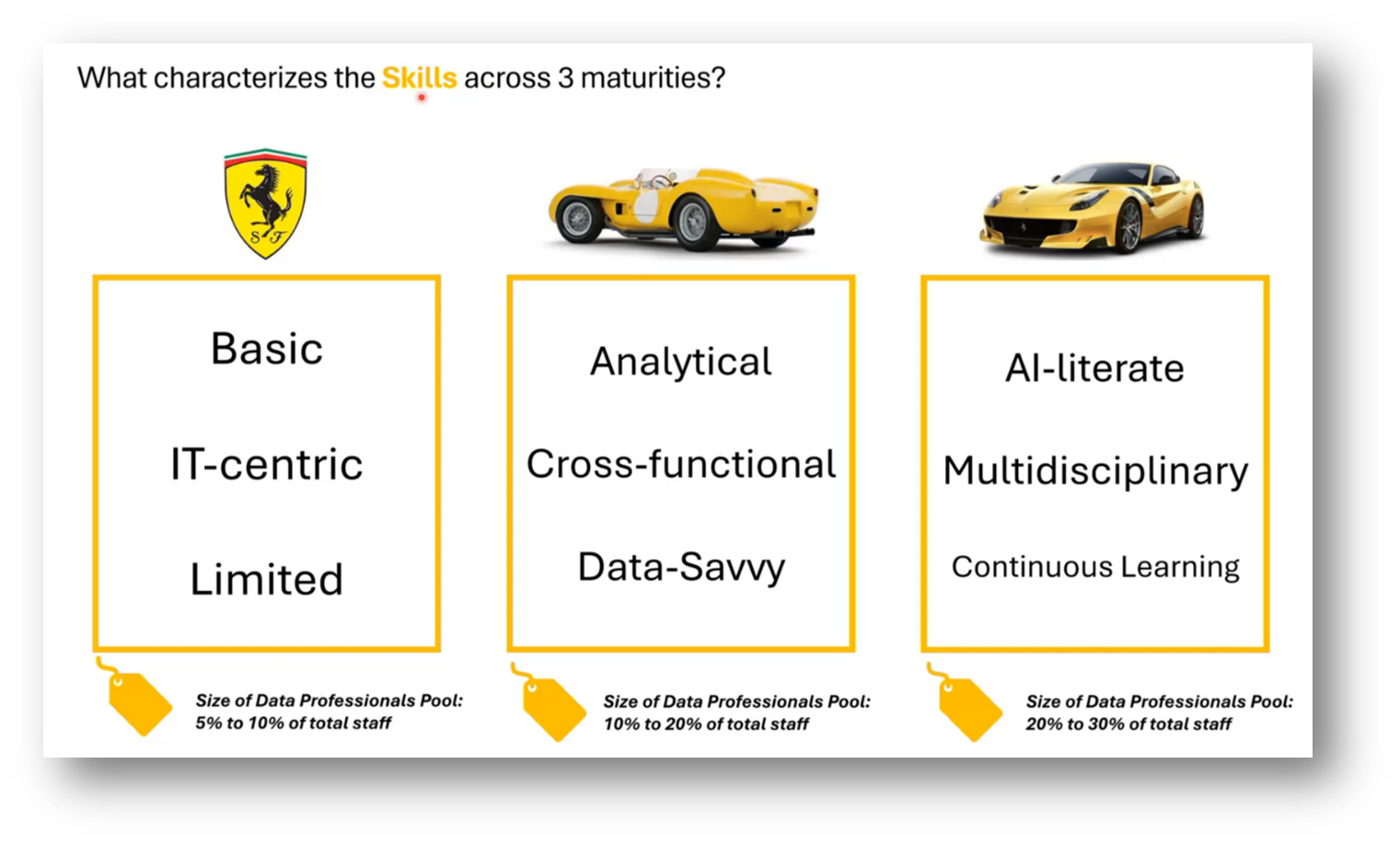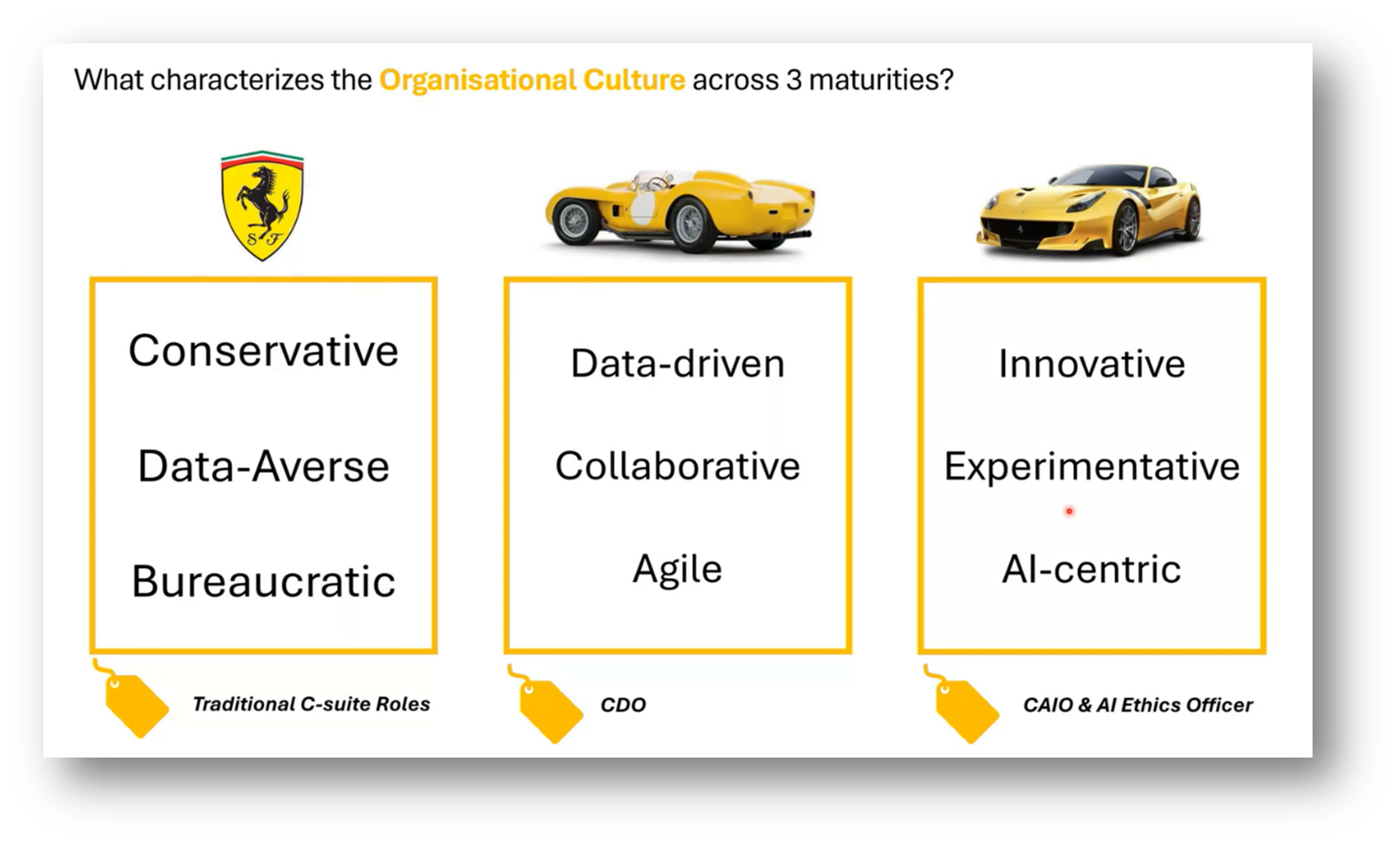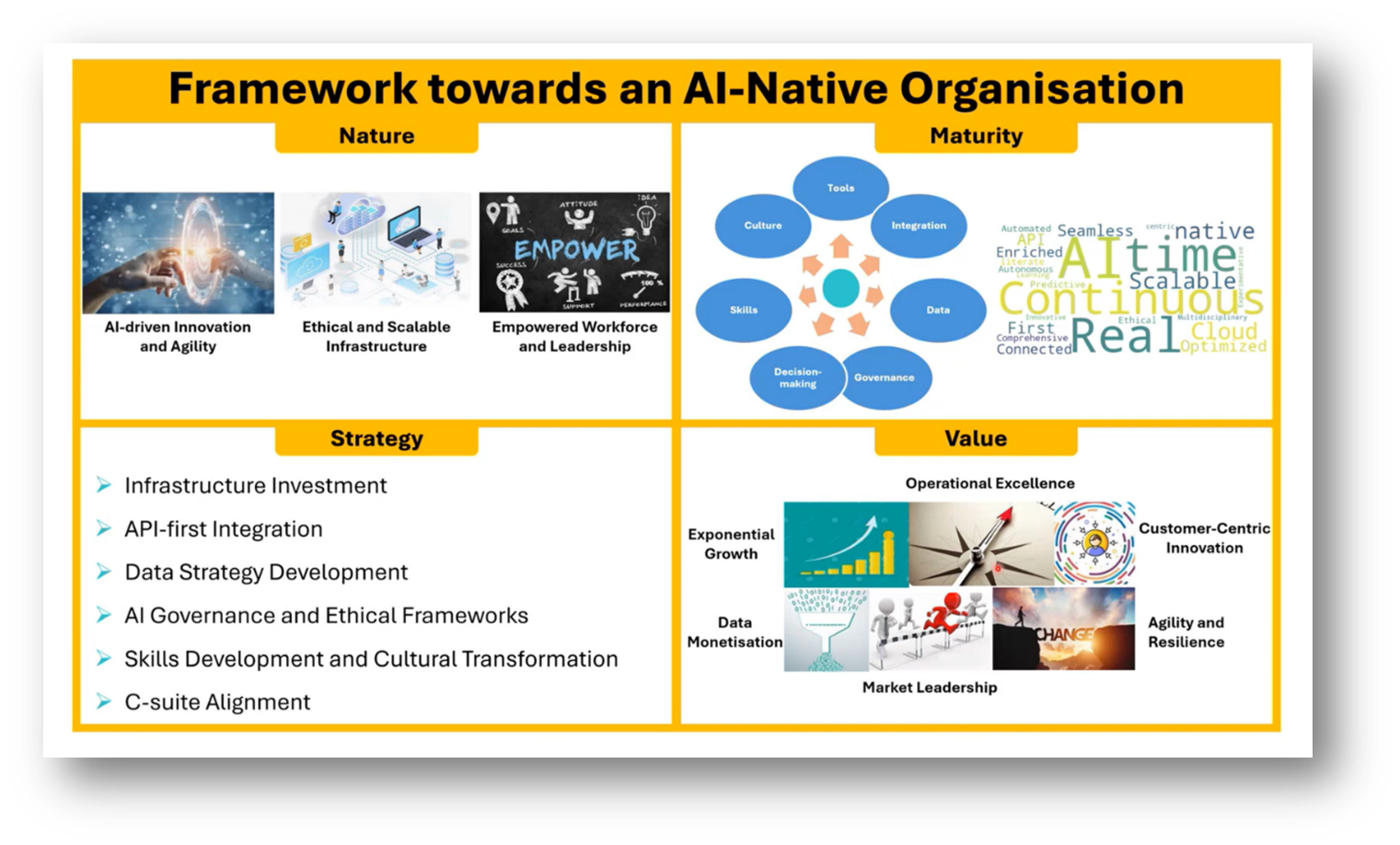Defining an AI Native Organisation Framework with Dr. Alet Smith
Executive Summary
This webinar outlines key themes in the evolution of Artificial Intelligence (AI) within the business landscape, particularly emphasising the transition from traditional IT roles to advanced data engineering. Dr Alet Smith explores the intricacies of Data Management and the varying levels of AI maturity across organisations, while also addressing frameworks for AI implementation, cloud computing, and the challenges associated with integrating application processes. Additionally, essential topics include the importance of data separation and integration in shaping business strategies, as well as the ethical considerations surrounding data privacy and customer consent in the digital advertising sphere.
The interplay of fear and greed in Data Governance and the implications of Big Data on decision-making are also highlighted. Furthermore, Alet examines the evolution of AI in data analytics, its role in fostering a data-driven organisational culture, and the transformation of businesses into AI-driven entities. The webinar presents insights into the job market and Data Governance challenges specific to Africa, as well as the relationship between Data Governance and value creation in the AI-centric world, with a focus on data ecosystems in financial technology.
Webinar Details
Title: Defining an AI Native Organisation Framework with Dr. Alet Smith
Date: 18/09/2024
Presenter: Dr Alet Smith
Meetup Group: DAMA SA User Group Meeting
Write-up Author: Howard Diesel
Contents
Evolution of AI in Business with Dr Alet Smith
A Journey from IT to Data Engineering
Data Management and AI Maturity in Business
AI Frameworks, Cloud Computing, and Data Management
Challenges of Application Process Integration in Organisations
Data Separation and Integration on Business Strategies
Data Privacy, Re-identification, and Ethics in the Context of Customer Data
Hyper-Personalisation and Consent Management in Digital Advertising
The Role of Fear and Greed in Data Governance
Data Governance and AI Ethics in Organisations
The Impact of Big Data in Decision Making
The Evolution of AI in Data Analytics and AI Skills
AI and Data-Driven Organisational Culture in Product Development
Transformation of AI-Driven Organisations
AI, Job Market, and Data Governance in Africa
Data Governance and Value Creation in AI World
Data Ecosystems in Financial Technology
Evolution of AI in Business with Dr Alet Smith
Howard Diesel opens the webinar and introduces Dr Alet Smith. Alet shares that MTN has made significant strides in evolving from traditional governance to a robust AI and data strategy, establishing itself as a leading digital platform in Africa. The company is focused on helping organisations understand the potential of data through benchmarking and maturity assessments, particularly in areas such as location data and personalisation.
Alet shares that recent engagements highlighted MTN's commitment to innovation and technical sophistication, aiming to position itself akin to Telefonica in the African market. Furthermore, the emphasis on AI-driven frameworks and the importance of Data Management is central to MTN's mission of fostering meaningful use of data across the continent, ultimately driving Africa’s advancement in these critical fields.
Reflecting on her 20-year journey at MTN, a Pan-African telecom organisation serving nearly 300 million subscribers across 19 markets, Alet emphasises the evolution from a reporting-focused organisation to one that is now driven by AI and insights. With experience spanning consulting roles and permanent positions since 2004, Alet shares insights gained through witnessing significant changes, such as the transition from managing 17 data warehouses to embracing digital transformation in connectivity and infrastructure. The session aims to foster discussion through impactful slides and encourages participant interaction and questions.
Figure 1 Building an Information Asset Towards Support of the AI-Native Organisation
A Journey from IT to Data Engineering
Alet's career journey began in 1999 as an IT engineer after initially studying mining engineering. She entered the world of Oracle ERP, where they began consulting and eventually became a data engineer responsible for tracing call data records to income statements. Additionally, Alet’s experience expanded to Data Management, Big Data Governance in India and South Africa, and projects in machine learning.
Over the last five years, Alet shares that her focus shifted toward data strategy, now integrated with AI strategy. She emphasises the importance of developing mature components within an organisation, likening it to building a car; just as all parts must work together effectively for the car to perform optimally, robust Data Governance and management are essential for successful AI implementation.
Figure 2 "What are we doing today?"
Figure 3 "What are the ingredients of the framework?"
Data Management and AI Maturity in Business
Howard shares a meeting with an executive who shared a compelling analogy about transforming their Data Management strategy, likening it to driving a bus from Johannesburg to Cape Town while implementing upgrades without interrupting operations. Howard emphasised the importance of continuous improvement in the business, which resonated strongly with the need for a robust Data Management community.
Alet then touches on the significance of data classification and governance, highlighting that many organisations struggle with their data maturity and often experience setbacks when attempting to become AI-driven. Additionally, it is crucial to address foundational elements such as Data Management and Governance to ensure successful initiatives in this domain.
Data is a critical driver of AI progress, emphasising the need for organisations to assess their current maturity state. Similar to seeking therapy, a maturity assessment helps identify where an organization stands, particularly when executives may have an inflated view of their capabilities due to investments in technology.
Organisations typically transition from being report-driven, where debates over data accuracy dominate discussions, to insights-driven, where structured decision-making emerges from reliable Data Management and governance. Ultimately, the goal is to become AI native, enabling automated decision-making based on insights, which raises the stakes of data accuracy and trust. The quality of data directly influences the effectiveness of AI initiatives, underscoring the importance of establishing a clear strategy with milestones throughout this journey.
Figure 4 "Why is a maturity conversation required?"
AI Frameworks, Cloud Computing, and Data Management
A question arose regarding the sharing of an AI framework in the context of South Africa's highly regulated industry. Alet notes that while specific intellectual property might not be disclosed, there is access to an impressive AI governance framework through an advisory board collaboration. The importance of ethics in AI, particularly with machines making decisions, was emphasised, suggesting a need for human oversight.
Alet highlights the issues of fragmentation within data reporting organisations, where multiple data stores can create confusion. In contrast, more mature organisations tend to unify and automate data processes, ultimately striving for a single source of truth by consolidating fragmented data warehouses.
MTN has invested significantly in developing its data strategy, utilising a middle layer named Eva, and is transitioning to a cloud-native environment in partnership with Microsoft. This strategic focus on maturity has facilitated easier cloud integration, as all relevant documentation, metadata, classifications, and rules are in place, allowing the hyperscaler team to work independently.
The importance of cloud technology is underscored by its connection with APIs, which are essential for enabling AI capabilities. Insights from the Barcelona Mobile World Congress emphasised the theme of connecting Earth to the cloud through standardised APIs. However, challenges remain regarding cloud computing costs, now categorised as OpEx rather than CapEx, leading to concerns about spending management and overall cloud maturity within the organisation.
Figure 5 "What characterizes the Infrastructure and Tools across 3 maturities?"
Challenges of Application Process Integration in Organisations
The integration and application process (AP) can be characterized by three stages of maturity. Initially, organisations often operate in an isolated manner, relying on point-to-point integrations between their Business Support Systems (BSS) and Operational Support Systems (OSS), resulting in inflexible structures and project turnaround times of 6 to 12 months.
As organisations transition to insights-driven structures, they achieve greater interoperability and extensibility, which improves project delivery times to around 1 to 3 months. However, to maintain competitive advantages, companies must rapidly adopt seamless, API-first, and real-time integrations. Failing to do so could leave them behind as competitors swiftly launch products into the market. Notably, MTN demonstrates a dual approach, with their IT shop still facing integration challenges while their enterprise business unit effectively embraces API-first real-time solutions.
Alet then moves on to focus on the complexities of implementing agile use cases, particularly in projects requiring significant system changes and configuration, such as a turnkey use case for campaign management on CVM platforms. The turnaround time for these projects can vary significantly, taking three to six months in non-API environments compared to one to three months when utilising a digital self-service, API-led approach.
This shift not only highlights the growing trend of organisations seeking self-service solutions but also emphasises the importance of adopting API-first strategies for real-time integration. A notable development includes the creation of a unified global data model, which has garnered interest from CIOs, including one in South Africa, who aims to transition to an API-led structure, leveraging this model to facilitate seamless data integration and optimise API journey creation.
Figure 6 "What characterizes the Integration and APIs across 3 maturities?"
Data Separation and Integration on Business Strategies
Alet highlights the challenges of siloed data within organisations, where business units lack insight into each other's customer profiles, hindering opportunities for cross-selling and upselling. She notes that as data maturity increases, integration improves, resulting in cleaner data and the ability to analyse in real-time. Additionally, this transformation is exemplified by a project involving the integration of a telecommunications digital twin with a retailer's customer data, enhancing customer insights significantly.
By leveraging combined data from multiple sources, organisations can develop a comprehensive understanding of their customers, including demographics, spending patterns, and lifestyles, ultimately leading to highly personalised interactions and an exponential increase in the value of their data assets.
Figure 7 "What characterizes the Data across 3 maturities?"
Data Privacy, Re-identification, and Ethics in the Context of Customer Data
Data privacy emphasises three key aspects: re-identification, ethics, and privacy security. Re-identification is addressed by ensuring that insights about customers are never linked to personally identifiable information, focusing instead on aggregated data, such as demographic trends in specific locations.
The use of privacy-preserving technologies, including blockchain, ensures data anonymity and security when overlaying and analysing information in secure environments, or “clean rooms,” where third-party data can be processed without direct access to individual customer information.
Ethical considerations are crucial, as organisations must commit to responsible data usage, ensuring that their practices do not disadvantage subscribers, such as affecting credit ratings. Overall, the approach prioritises privacy and security while maintaining ethical standards in handling customer data.
Hyper-Personalisation and Consent Management in Digital Advertising
Alet emphasises the shift from traditional personas to hyper-personalisation in digital marketing, highlighting the example of Spotify's tailored playlists. This approach focuses on understanding individual behaviours and preferences through consent management, wherein users willingly share their data (e.g., through cookie acceptance) to receive personalised experiences.
For instance, a case was presented involving a cohort of young males in Cape Town who were not adopting an e-commerce app; targeted advertising could be deployed to encourage their engagement, but only if consent was granted. With a robust consent database of 8 million users who have opted in, the process underscores the importance of consent in digital advertising, ensuring that only those who agree to it are contacted, mirroring Google's cookie management practices.
The Role of Fear and Greed in Data Governance
The importance of effective Data Governance and management is underscored by the historical example of the significant fine incurred in Nigeria in 2014, which resulted from inadequate data lifecycle management. This situation arose not from malicious intent but from a failure to properly tag data, understand regulations, and map data lineage.
The fear of facing similar penalties has since driven substantial investment in Data Governance programs, highlighting that stakeholders are primarily motivated by fear and greed. As a result, while current data processes may still exhibit inconsistencies and silos, the lessons learned from past experiences have led to a much stronger emphasis on robust Data Governance in the organization.
Figure 8 "What characterizes the Data Processes and Governance across 3 maturities?"
Data Governance and AI Ethics in Organisations
The transition to an insights-driven organisation emphasises the importance of Data Governance and compliance with privacy regulations like GDPR and POPIA, particularly as businesses adopt AI technologies. Effective governance is crucial to managing the risks of privacy and security breaches, especially when utilizing Large Language Models (LLMs), which operate as "black boxes."
Organisations must establish clear rules regarding data input and output from these models and incorporate ethical testing to address biases. At MTN, the implementation of an AI safety policy supports this governance framework and ensures that, while automation increases efficiency through fully automated processes like RPA, human oversight remains integral in decision-making, particularly in supervised and generative AI applications.
The Impact of Big Data in Decision Making
Alet highlights the critical shift from traditional, reactive decision-making, which often relies on gut instincts and outdated practices such as using Excel as a database, to a more proactive, insights-driven approach that leverages data analytics. In many organisations, executives still cling to personal experience instead of trusting data, which can hinder effective decision-making.
As companies embrace predictive analytics and Big Data, they can create real-time, hyper-personalised offers for customers, significantly increasing revenue and improving efficiency. This transition emphasises the need for organisations to move away from legacy systems and adopt advanced Data Management techniques to harness the full potential of their data.
Figure 9 “What characterizes the Decision-making across 3 maturities?"
The Evolution of AI in Data Analytics and AI Skills
Alet focuses on the maturity of analytics, progressing from descriptive to predictive, prescriptive, and cognitive stages. While predictive analytics is valuable, the focus should ideally shift toward prescriptive analytics, which offers a broader range of actionable options rather than a single solution. This approach enhances automation, integrating technologies like Robotic Process Automation (RPA) and generative AI, transforming data products beyond simple reporting.
A noteworthy aspect of prescriptive analytics is the use of machine learning for classification, which helps create customer personas based on spending behaviour. This enables targeted actions for high, medium, and low-value customers, fostering automatic interventions that align with the predictive capabilities of the analysis.
Alet highlights the competitive nature of the Daido ecosystem, where organisations thrive by showcasing impactful personas. She points out the pressing global issue of a bloated population with inadequate AI skills, particularly evident in Africa, which has a burgeoning youth demographic.
In the coming years, a significant proportion of the employed workforce will be young individuals from Africa, prompting investments from non-profits to enhance their skills. Unlike in other developing regions, when a young person from a disadvantaged background in Africa secures a job, they often support a larger network, helping up to sixteen others. This communal support emphasizes the need for collaborative efforts to address the skills shortage and empower data professionals across the continent.
Cross-functionality in teams, comprising roles like data analysts, data engineers, and privacy experts, fosters a collaborative environment for product development, where a significant portion (10-20%) of staff can contribute despite non-technical backgrounds, benefiting from their familiarity with tools like Excel. As the shift towards AI accelerates, it becomes essential for individuals to be AI literate, understanding ethics, biases, and the functions of various AI technologies.
This era sees HR executives engaging with AI discussions alongside CIOs, as the complexity of calling APIs diminishes, making digital creation more accessible. The landscape emphasizes continuous learning and curiosity, allowing individuals of all ages to compete and adapt quickly, although wisdom often remains a missing element among younger professionals.
Figure 10 "What characterizes the Skills across 3 maturities?"
Figure 11 "What characterizes the Organisational Culture across 3 maturities?"
AI and Data-Driven Organisational Culture in Product Development
The importance of integrating marketing analytics and AI in product development is emphasised, highlighting the need for understanding customer needs rather than relying solely on personal assumptions. A multidisciplinary approach that incorporates diverse perspectives is crucial, especially within varied cultural contexts, as organizational culture significantly influences strategies related to AI and data.
As businesses evolve, traditional C-Suite roles are transitioning toward more data-driven and collaborative structures, leading to the emergence of positions like Chief Data Officer and Chief AI Officer. This shift fosters innovation and experimentation, while also necessitating a leaner workforce due to increased automation. Staying literate in AI and supporting future generations in developing these skills is vital to remaining competitive in an AI-centric landscape.
Transformation of AI-Driven Organisations
The framework for developing an AI-native organisation emphasises the importance of innovation, agility, and ethical practices within a scalable cloud-based infrastructure. Key components include fostering an empowered workforce and leadership, maturing organisational capabilities, and ensuring alignment within the C-Suite, particularly the CEO’s understanding of AI.
To successfully implement this transformation, companies must invest in their infrastructure, adopt an API-first approach, develop a robust data strategy, and establish governance frameworks addressing safety and ethics. These foundational elements are crucial for cultural transformation and the overall effectiveness of the organisation in an increasingly AI-driven landscape.
Alet emphasises the importance of measuring various types of value, particularly operational excellence, customer-centric innovation, agility, and resilience, which can enable companies to lead existing markets and penetrate new ones. Responsible data monetisation can drive exponential growth, significantly surpassing the hype cycle associated with advancements in large language models. Additionally, this exponential growth, leading to double or even triple-digit increases, highlights the effectiveness of well-implemented data ecosystems and ICT tools in generating new revenues. The exchange concluded with gratitude for insightful questions from participants, fostering a valuable conversation.
Figure 12 "Framework towards an AI-Native Organisation"
AI, Job Market, and Data Governance in Africa
Alet expresses admiration for a presentation, highlighting a shared vision of uplifting the African continent through financial inclusion and economic activity. They discussed ongoing initiatives to train interns in Data Management, focusing on SAP VRP environments, and explored potential collaborations for AI learnerships to empower youth in Africa. Additionally, Alet points out the paradox of automation in developed countries, noting that as industries mature, job losses occur due to the increasing adoption of AI, which often aims to reduce human involvement, as exemplified by the seamless, automated processes at Dubai airport.
In Africa, MTN focuses on leveraging AI to enhance resilience and security across food, energy, education, and health sectors, aiming to create more job opportunities and upskill its workforce rather than eliminate roles due to automation. The company's Data Governance framework is consistently applied across all its operations in Africa, ensuring uniformity in data handling regardless of location.
MTN has adopted a scalable platform that supports its entire operational landscape, using the TDWI framework for Data Management, governance, analytics, and culture. This approach allows for self-assessments and maturity evaluations to be rolled out across various countries, fostering a unified strategy in AI implementation and Data Governance.
Data Governance and Value Creation in AI World
Data sovereignty prevents the establishment of a unified data source across 19 markets, leading MTN to create a standardised instance of Eva in each country. These instances maintain the same setup and capabilities, while strategic APIs funnel data to a centralised system without identifiable information.
The key to effective Data Governance lies in linking it to clear business use cases and value, rather than focusing solely on maturity metrics. By emphasising the financial benefits of accurate data and fostering a culture of data-driven decision-making, organisations can navigate Data Governance successfully, ensuring that each use case receives appropriate controls and execution aligned with business strategies.
Data Ecosystems in Financial Technology
In a discussion on data ecosystems, an attendee emphasised the importance of viewing them at various levels, from individual enterprises to broader interactions among institutions. They compared a data ecosystem to a city, highlighting that both require a robust physical infrastructure, standardised practices, and effective service providers to function efficiently.
Just as cities depend on reliable services like electricity and clean water, data ecosystems rely on common protocols and community organisations to ensure data quality and facilitate sharing. This collaboration among diverse players—enterprises, NGOs, and public organizations—fosters the development of evolving common standards essential for efficient Data Governance and protection.
Alet then emphasises the importance of developing community-wide standards within the fintech industry to enhance collaboration and data sharing among various sectors. By working together, stakeholders can reduce costs, protect consumer rights, and create opportunities for innovation.
In closing, Alet shares that successful use cases must be promoted to demonstrate the value of data collaboration, ensuring that it is governed responsibly. Furthermore, the call for open data access highlights its crucial role in driving financial inclusion. Active participation in governance and advisory boards is essential to foster a culture of transparency and ongoing dialogue in the industry.
If you would like to join the discussion, please visit our community platform, the Data Professional Expedition.
Additionally, if you would like to be a guest speaker on a future webinar, kindly contact Debbie (social@modelwaresystems.com)
Don’t forget to join our exciting LinkedIn and Meetup data communities not to miss out!


